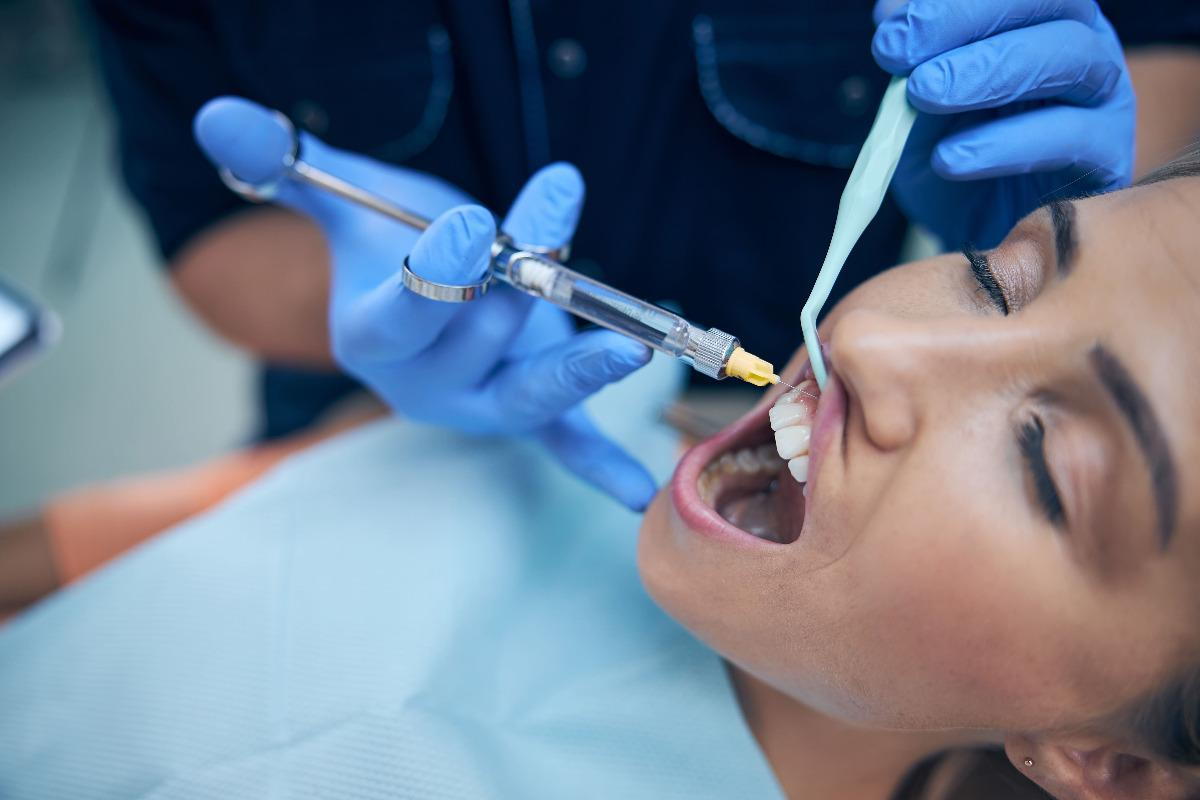
For many people, a visit to the dentist brings about a heightened sense of anxiety. The sight of dental instruments, the noise of a drill, and the thought of pain can send some patients into a state of distress. However, the development of advanced dental sedation and anesthesia methods has greatly contributed to ensuring a more comfortable, pain-free dental experience. From more traditional methods like nitrous oxide gas and Novocain to intravenous (IV) infusions and oral conscious sedation, today’s dental professionals have a variety of options to help patients through their procedures with greatly reduced pain and anxiety.
Nitrous Oxide
A common choice for quick, non-invasive dental procedures is nitrous oxide, also colloquially known as "laughing gas." With a sweet, pleasant aroma, nitrous oxide is a gas that is inhaled through a mask fitting comfortably over your nose. Nitrous oxide induces a sense of euphoria or light-heartedness, helping to calm any underlying anxiety or nervousness.
Upon inhalation, you can expect to feel a warm, tingling sensation or a slight heaviness in your limbs. The effect is almost immediate, putting patients in a relaxed state while maintaining their consciousness, thus allowing them to communicate with the dental team during the procedure.
Nitrous oxide’s popularity stems from its mild and easily controllable nature. The level of sedation can be readily adjusted, making it an adaptable choice for a wide variety of dental procedures and patient ages, from routine cleanings for apprehensive children to tooth extractions for adults.
As for recovery, one of the biggest advantages of nitrous oxide is its fast elimination from the body. Within minutes of stopping the gas and breathing in pure oxygen, its effects fully wear off. This speedy recovery time means most patients can safely drive themselves home following their appointment, returning to their daily routine without any lingering sedative effects.
While nitrous oxide is generally a safe and effective method, it's not suitable for everyone. Certain conditions such as pregnancy, respiratory diseases, or specific medication usage may require alternative methods. As always, a detailed discussion with your dentist at Cotswold Dentistry about your medical history and comfort level is crucial in choosing the most suitable form of anesthesia for your dental care needs.
Local Anesthesia – Blocking the Pain
When it comes to mitigating discomfort during a wide range of dental procedures, from fillings to root canals, local anesthesia is a reliable ally. It functions by creating a temporary numbing effect in a specific area of the mouth, essentially acting as a barrier against nerve signals and effectively blocking any sensations of pain. This form of dental anesthesia is typically delivered through a carefully targeted injection.
Upon administration, you may feel a slight pinch or a sting, but the discomfort is fleeting. Once the numbing sets in, it effectively renders the area pain-free, ensuring a smooth and comfortable dental procedure. Although you remain fully conscious throughout the process, you'll experience no physical discomfort, allowing you to remain calm and relaxed while your dentist expertly works on improving your oral health.
Post-procedure, the effects of local anesthesia slowly wane over a span of a few hours. This brief recovery period enables you to seamlessly transition back to your regular activities with little to no disruption. Unlike other forms of sedation, local anesthesia does not impact your ability to drive or operate machinery post-procedure, a convenience that many patients appreciate.
However, it's worth noting that while local anesthesia is generally safe, it's not a one-size-fits-all solution. Prior to its administration, your dentist will undertake a comprehensive evaluation of your health history and current medications to ensure there's no risk of adverse reactions. It's this rigorous approach to patient safety that underscores the commitment dental professionals have towards delivering a secure, pain-free, and pleasant dental experience.
IV Sedation – An Option for Complex Procedures
Intravenous sedation, more commonly known as IV sedation, provides an exceptional solution for those undergoing intricate dental procedures or for individuals who suffer from high levels of dental anxiety. Administered directly into your bloodstream, this method delivers a profound level of sedation, allowing you to stay conscious while significantly reducing feelings of discomfort and worry.
The real game-changer of IV sedation lies in its ability to provide a deep state of relaxation. Although you remain aware enough to respond to verbal cues, your sense of time may be altered, and most patients recall little to nothing of the dental procedure once the sedation wears off. This sense of "twilight sleep" or conscious sedation not only assures a comfortable dental experience but also encourages individuals with serious dental anxieties to regularly maintain their oral health.
However, a noteworthy point about IV sedation is its extended recovery period. The effects of this method can persist for several hours following the procedure, resulting in feelings of grogginess or light-headedness. Therefore, it's paramount that you arrange for a ride home post-procedure. While this may require a bit of pre-planning, the assurance of a comfortable, anxiety-free dental experience often makes it worth the effort.
It's important to note that IV sedation is a sophisticated method that requires specific expertise. Your dentist will ensure they have a comprehensive understanding of your health history and current medications before proceeding with this method of sedation. This careful and meticulous approach is a testament to the commitment dental professionals hold towards patient safety and well-being.
While IV sedation might not be for everyone, it serves as an invaluable tool in the arsenal of dental sedation methods. Providing an avenue for anxiety-free and comfortable dental experiences, it encourages even those with significant dental fears to address their oral health needs confidently and comfortably.
Oral Conscious Sedation – Comfort in Pill Form
If the idea of needles makes you uneasy, oral conscious sedation might be your preferred route for dental sedation. This technique involves the use of prescription medication, typically in a simple pill format, taken prior to your dental procedure. What sets this method apart is its ability to create a calm, relaxed state while ensuring that you remain responsive to your dentist's directions throughout the procedure.
As the name implies, 'conscious sedation' ensures that while your physical discomfort and anxiety are significantly reduced, your ability to cooperate with your dentist remains intact. It's this balance that makes oral conscious sedation a favored choice among those with needle phobias or substantial dental anxiety.
However, it's essential to be aware that the tranquilizing effect of oral sedation does necessitate a longer recovery period compared to other methods. This is usually a matter of a few hours, during which time you might feel slightly drowsy or disoriented. Due to these lingering effects, it's strongly advised to arrange for a companion to accompany you home after the procedure.
This minor inconvenience, though, is often overshadowed by the comfortable, stress-free dental experience that oral conscious sedation affords. It's important to remember, however, that this method, like all others, requires an in-depth consultation with your dentist to discuss your medical history and comfort level. This careful consideration ensures that the method chosen suits your unique needs and circumstances, enabling a pleasant, relaxed dental visit.
As always, prioritizing your safety and wellbeing is at the heart of dental professionals' work. So, whether it's a minor procedure or a more complex one, understanding the different sedation options available, such as oral conscious sedation, can transform your dental care journey, helping you navigate each visit with ease and confidence.
Ensuring Your Comfort and Safety
Today’s dental care is not just about providing top-tier dental services, but ensuring that these services are carried out in a manner that alleviates fears, reduces discomfort, and instills a sense of security. Prior to the administration of any form of dental anesthesia or sedation, your Cotswold dentist will engage in an open dialogue, addressing the ins and outs of the procedure, reviewing your medical past, and discussing your levels of unease.
This holistic approach serves a twofold purpose. It allows the dentist to meticulously assess the suitability and safety of the proposed sedation method in relation to your individual circumstances. Secondly, it provides you, the patient, with a clear understanding of the process ahead, equipping you with the knowledge to alleviate any dental fears or anxieties you might harbor.
While every individual's experience with dental procedures varies, the introduction of advanced dental anesthesia and sedation methods has certainly made strides towards making dental visits a more agreeable experience. The goal remains clear - to provide an environment where dental care can be administered with minimal discomfort, allowing patients to maintain their oral health without fear or anxiety.

